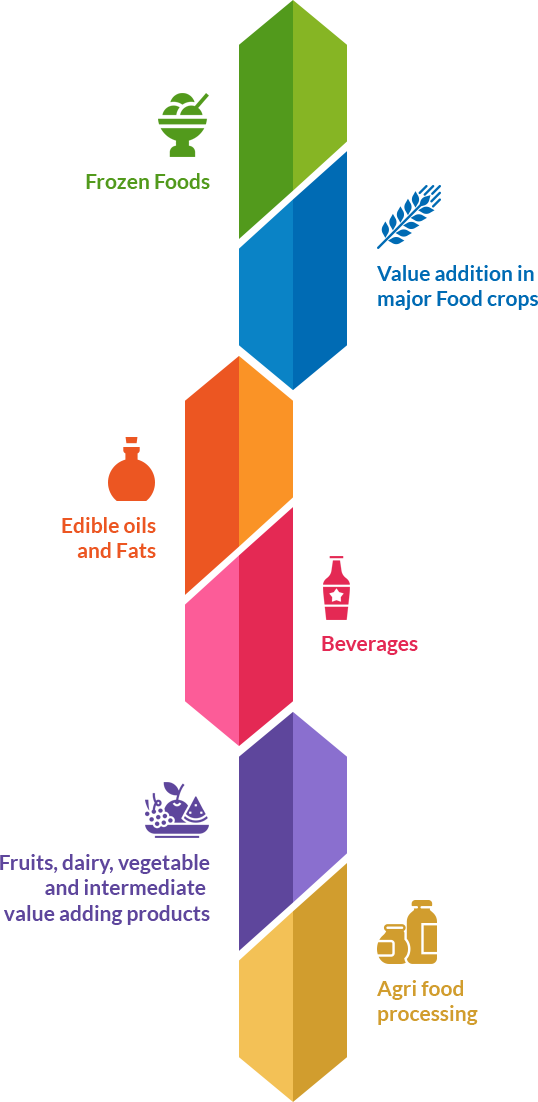Food Processing
SECTOR BRIEF
- Pakistan is home to the world’s sixth largest population with a growing middle class. As of 2018, there are approximately 17 million middle class households and 102 million middle class individuals.
- The food and beverage processing industry is the 2nd largest industry of Pakistan after textiles, accounting for 27% of the value-added production and 16% of employment in the manufacturing sector.
- Food processing accounted for an annual average of $223.5m in FDI from 2012-2018.
- The three major industry groups are (1) frozen food (2) value addition in major food crops and (3) fruits, vegetables and intermediate products
- Pakistan was awarded the Generalized Scheme of Preferences (GSP) Plus Status (Zero to Low Duty) by the European Union in 2014 which has the potential to greatly uplift the exports of processed food products.
Highlights
- 2nd largest Industry in Pakistan
- $4tn Annual global food retail sales
- 223.5m Average annual FDI(2014-2018)
Main Sector

Market Structure and Dynamics
Frozen foods
A growing population, coupled with an increase in urban lifestyles has been the primary driver behind the rising demand for frozen food products. Additionally a budding retail phenomenon is finding its way in the urban markets. This factor has been complemented with the rise of malls, super markets, hyper marts, drug marts e.g. Metro, Al Fatah and Hyperstar, instead of the traditional kiryana and general stores. Local organizations such as Dawn Foods, season foods, K&N’s, Sabroso & Sufi have made significant impact in the market with their frozen food products.
Value addition in major food crops
Pakistan is one of the largest producers of industrial crops such as rice and wheat. Such crops can be used in the production of a variety of different products such as cereals, macaroni, spaghetti, pasta etc. Good food processing techniques such as extrusion are being utilized in several developed countries, and are now finding its way to Pakistan as well. Currently, the extrusion technology is being utilized in Pakistan in the processing of food products like cereals, pasta, snacks etc.
Edible oils and fats
The total availability of edible oil from all sources in Pakistan is estimated at approximately 3 million tons. 23% of oil seeds are produced domestically while the remaining is mostly imported which provides a huge opportunity for an increase in domestic production. These oil seeds are used extensively in the vegetable ghee and cooking oil industry of Pakistan which is one of the largest manufacturing industries in Pakistan. There are approximately 160 small and medium sized vegetable ghee and cooking oil units spread all across Pakistan.
Beverages
The beverage processing industry’s main products include dehydrated products, fruit products, including fruit juices/drinks, canned fruits and carbonated beverages. The industry has been categorized into two sectors broadly: (1) Juices, squashes and syrups and (2) Aerated beverages. Both the sectors have recorded an impressive growth with major players such as Pepsi, Coca Cola, Nestle, Mitchells, Shezan, Maza etc. Their production units are mostly located in the Punjab specifically Lahore, Sargodha and Bahawalpur.
Fruits, dairy, vegetable and intermediate value adding products
Pakistan is the 4th largest milk producing country in the world which provides tremendous opportunities for value added products in the dairy sector. In the fruits and vegetable sectors, there are more than 25 processing plants. Most of the these are citrus based owing to its abundant acreage. Following citrus are mangoes which are abundant in Southern Punjab and Sindh. The major processing plants are located in Peshawar, Lahore and Karachi. Value added products include jams, jellies, marmalades, squashes, canned fruits etc.
Agri food processing (Primary process foods)
This sector includes all the agricultural food produce (primary). This sector alone accounts for 21% of Pakistan’s GDP and includes the primary processing of fruits, vegetables, flour, sugar, pulses and grains. More than 22 varieties of vegetables are produced in Pakistan and there are approximately 1,400 flour mills. The country is ranked 5th in the world cane acreage and 9th in sugar cane production. Pulses are the most important source of vegetable protein in Pakistan and are cultivated on 5% of the total cropped area.
Areas to invest
-
Olive Oil Extraction Units
-
Value addition in fruits
-
Dairy
-
Frozen foods(fruits, vegetables and meat)
-
Potato powder and flakes manufacturing unit
KEY HIGHLIGHTS OF PAKISTAN’S FOOD PROCESSING SECTOR
- 4th largest milk producer in the world1
- 11th largest citrus producer in the world2
- 35 different varieties of vegetables produced3
- More than 30 varieties of fruits produced.4
CPEC’s Special Economic Zones
There are 4 Special Economic Zones within CPEC that are targeted at food processing:
Project Name Type of industry Area Rashakai Economic Zone, M1, Nowshera Fruit, Food, Packaging, Textile stitching, Knitting 1,000 acres Bostan Industrial Zone Fruit processing, Agricultural machinery, Pharmaceutical, Motor bikes assembly, Chromites, Cooking Oil, Ceramic Industries, Ice and Cold Storage, Electrical Appliance, Halal Food Industry 1,000 acres Allama Iqbal Industrial City, M3, Faisalabad Textile, Steel, Food processing, Plastics, Agriculture, Printing and Packaging, Light Engineering 3,000 acres ICT Model Industrial Zone, Islamabad Steel, Food processing, Pharmaceuticals & Chemicals, Printing and Packaging, Light Engineering 500 acres Any foreign investor looking to invest in the food processing sector in Pakistan can leverage the trade routes and Special Economic Zones that have been established as a result of CPEC. This will lead to a competitive advantage due to the lower overheads in the country, coupled with reduced transportation costs. Furthermore, China’s growing population is a huge target market for food exports.
Key information
Foreign companies already operating in Pakistan
- Nestle
- Unilever
- Coca-Cola
- Pepsi
- Metro Cash and Carry
- Hyperstar (Carrefour Group)


















